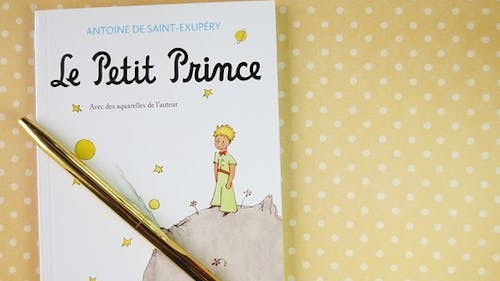FUCHS: Do not let stress hinder your capacity to see beauty in life
Column: Questioning Jules

One of my absolute favorite quotes from any book I have ever read is “On ne voit bien qu’avec le coeur. L'essentiel est invisible pour les yeux." The original French quote is so beautiful, but knowing not everyone speaks French, it translates to “You can only see with your heart. The essential is invisible to the eyes.”
When I first read this quote I was in awe of what the message said. This comes from the book “Le Petit Prince” ("The Little Prince") which is a French literary classic. It is meant to be for children, but a lot of the messages become even more important and meaningful as you get older.
Let us unpack this quote and message a little. "The Little Prince" is one of the most philosophical books I have ever read. The entire story itself discusses how important it is to cherish having a young heart, having fun and appreciating the people in your life.
One of the many things mentioned is how miserable adults are. Adults often drown themselves in work and become so consumed with their problems that they miss all of the beautiful things that life has to offer. This is important to remember, especially as a college student, as we are all hustling and trying to be the best we can.
When I was in high school, I cared so much about what other people thought of me that it made me miserable. I actually became very bitter and mean after a while because I felt like I could not truly be myself.
It is okay to have the heart of a child, no matter what age you are. It is okay to smile, laugh as loud as possible, watch your favorite childhood shows, eat your favorite childhood snacks and just have fun with life.
Throughout the book, "The Little Prince" travels to many different planets where he meets many different people. A lot of these people are commentaries on negative traits in adult life — one man is very conceited, another is obsessed with becoming rich, one is obsessed with being powerful and having authority over others.
The moral of the story is that the people who were living on the other planets were so consumed with their goals that they never found things to become passionate about, they never had meaning in their life or loved anyone or anything but themselves.
These all allude to that main beautiful message — the essential things in life are seen with the heart, not the eyes. It does not matter how rich you are, how many people are influenced by you, what people think of you. What matters is that you are happy and live the best life that you are meant to live.
It is normal to become concerned about money, authority and public image — these are all parts of being human. It is important to be more conscious of the unseen essentials in life like love, happiness, knowledge, selflessness and community.
The end of the semester is upon us, which means that final exams, papers, projects and stress are also just around the corner. Amid these busy and stressful times, remember that you are lucky to have the opportunity of an education you do, the access to the amount of information you do and to have everything you do in life.
Do not focus on the stress you can see with your eyes, rather focus on the joy you can feel in your heart from embracing the gifts life brings — like the beautiful weather we have been having and the summer season coming.
Julia Fuchs is a School of Arts and Sciences junior majoring in history and anthropology and minoring in French and archaeology. Her column, "Questioning Jules," runs on alternate Thursdays.
*Columns, cartoons and letters do not necessarily reflect the views of the Targum Publishing Company or its staff.
YOUR VOICE | The Daily Targum welcomes submissions from all readers. Due to space limitations in our print newspaper, letters to the editor must not exceed 900 words. Guest columns and commentaries must be between 700 and 900 words. All authors must include their name, phone number, class year and college affiliation or department to be considered for publication. Please submit via email to oped@dailytargum.com by 4 p.m. to be considered for the following day’s publication. Columns, cartoons and letters do not necessarily reflect the views of the Targum Publishing Company or its staff.



